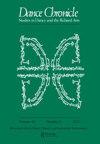Universalizing the Specific: Janet Collins’s Spirituals and Genesis
IF 0.1
3区 艺术学
0 DANCE
引用次数: 0
Abstract
Abstract African American modern dancer and ballerina Janet Collins challenged conventions for representing race, gender, and religion in her Spirituals suite (1947) and Genesis (1965), works that brought together Jewish and African American spiritualities. Countering the assumption that only white dancers access the privilege to present themselves in universalizing ways, I argue that Collins used a process of self-universalization. This article shows how Collins employed dance techniques and thematic content usually coded as white to highlight the spiritual experiences of Black women and to circumvent assignations of “Negro dance” that would have failed to encompass her technical range and subject position.普遍化具体:简·柯林斯的精神与创世纪
摘要非裔美国现代舞者和芭蕾舞演员珍妮特·柯林斯在她的《灵修组曲》(1947年)和《创世纪》(1965年)中挑战了代表种族、性别和宗教的传统,这些作品将犹太和非裔美国人的灵修结合在一起。与只有白人舞者才有权以普遍化的方式展现自己的假设相反,我认为柯林斯使用了一个自我普遍化的过程。这篇文章展示了柯林斯是如何运用通常被编码为白人的舞蹈技巧和主题内容来突出黑人女性的精神体验,并避开那些无法涵盖她的技术范围和主题立场的“黑人舞蹈”。
本文章由计算机程序翻译,如有差异,请以英文原文为准。
求助全文
约1分钟内获得全文
求助全文
来源期刊

DANCE CHRONICLE
DANCE-
CiteScore
0.40
自引率
0.00%
发文量
22
期刊介绍:
For dance scholars, professors, practitioners, and aficionados, Dance Chronicle is indispensable for keeping up with the rapidly changing field of dance studies. Dance Chronicle publishes research on a wide variety of Western and non-Western forms, including classical, avant-garde, and popular genres, often in connection with the related arts: music, literature, visual arts, theatre, and film. Our purview encompasses research rooted in humanities-based paradigms: historical, theoretical, aesthetic, ethnographic, and multi-modal inquiries into dance as art and/or cultural practice. Offering the best from both established and emerging dance scholars, Dance Chronicle is an ideal resource for those who love dance, past and present. Recently, Dance Chronicle has featured special issues on visual arts and dance, literature and dance, music and dance, dance criticism, preserving dance as a living legacy, dancing identity in diaspora, choreographers at the cutting edge, Martha Graham, women choreographers in ballet, and ballet in a global world.
 求助内容:
求助内容: 应助结果提醒方式:
应助结果提醒方式:


